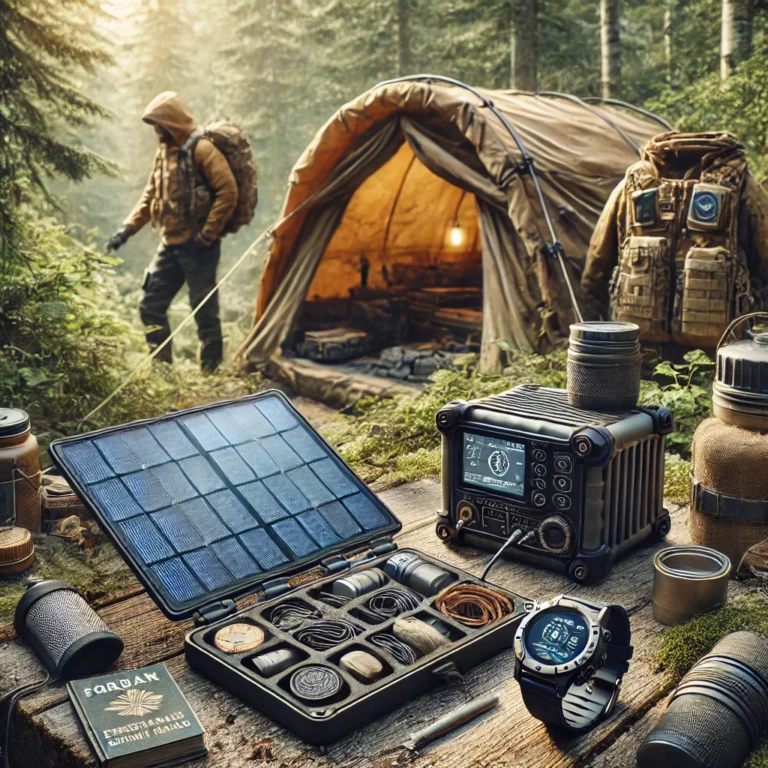In today’s fast-changing world, it’s more important than ever for survivalists and preppers to stay up-to-date on the latest techniques that could make all the difference in an emergency situation. From urban crises to wilderness challenges, modern survival skills blend traditional knowledge with innovative practices. Here, we’ll explore some of the most impactful survival techniques for 2024 that will help you and your family stay safe and resilient in any scenario.
1. Advanced Water Filtration and Harvesting Methods
Access to clean water is essential for survival, but traditional methods such as boiling or basic water filters may not always be practical. The newest survival techniques incorporate portable nanofiltration systems that can remove microscopic contaminants, including viruses.
Practical Tip:
Invest in a solar-powered, portable water filtration unit that not only purifies water but also stores power. Pair it with an atmospheric water generator that extracts moisture from the air—ideal for areas where fresh water sources are scarce.
2. DIY Energy Solutions: Solar Generators and Hand-Crank Power
Off-grid energy options have evolved far beyond basic hand-crank radios and solar panels. The latest compact solar generators can now power appliances for several hours and can be paired with foldable, lightweight solar panels.
Practical Tip:
Choose a solar generator that has a modular design so you can expand its capacity as needed. Additionally, keep a hand-crank generator as a backup for emergencies when solar power isn’t an option.
3. Digital Navigation and Offline Mapping
GPS technology is indispensable, but when cellular networks fail, offline solutions are vital. Modern mapping apps now allow preppers to download entire regional maps that function without a data connection.
Practical Tip:
Download open-source topographical maps of your region and practice orienteering with them. Investing in a smartwatch that supports offline GPS can also be invaluable for quick navigation.
4. Wild Edibles and Foraging in Urban Areas
Foraging isn’t limited to rural settings. The urban landscape offers surprising sources of nutrition if you know what to look for. In 2024, many preppers are turning to micro-foraging, a practice that identifies edible plants in suburban and urban settings.
Practical Tip:
Take an urban foraging workshop to learn how to identify safe-to-eat plants like dandelions, clovers, and plantains. Apps that identify plants using AI can be a helpful tool in this process.
5. Mental Resilience Training
The importance of mental toughness in survival scenarios is often overlooked. Modern training incorporates psychological resilience-building activities like controlled stress exposure and visualization techniques.
Practical Tip:
Set aside time for mindfulness and meditation exercises that prepare your mind for high-stress situations. Consider joining a survival group that focuses on simulations that mimic real-world emergency scenarios, helping you build familiarity and confidence.
6. Enhanced First-Aid and Trauma Care
Basic first-aid skills are essential, but advanced knowledge in trauma care is becoming crucial for modern preppers. Learning how to use tourniquets, hemostatic agents, and proper splinting techniques can save lives in critical situations.
Practical Tip:
Enroll in a Wilderness First Responder (WFR) course or a Tactical Combat Casualty Care (TCCC) class. These programs teach essential skills, such as how to manage severe bleeding and stabilize fractures.
7. Communication Without Networks
Communication is critical during an emergency, but cellular networks can become overloaded or fail altogether. HAM radios remain reliable, but new tools like mesh networking devices are changing the game by allowing smartphones to communicate without cell service.
Practical Tip:
Invest in a pair of mesh networking devices, such as goTenna or Beartooth, which use radio frequencies to link devices and send text messages or GPS coordinates. Also, familiarize yourself with HAM radio basics; the license is affordable and widely recognized among preppers.
8. Shelter Innovations
Temporary shelters have come a long way, with new materials that provide better insulation, are easier to set up, and have increased portability. Lightweight, weather-resistant tarps with built-in thermal liners can keep you warm during cold nights and cool during hot days.
Practical Tip:
Opt for a multi-layer survival shelter that combines water resistance with thermal reflectivity. These are compact and can be easily carried in a go-bag, providing instant shelter and protection from the elements.
9. Practical Self-Defense Techniques
Learning self-defense is more than mastering martial arts—it involves knowing how to use everyday objects to protect yourself and understanding situational awareness. The latest trend involves training with improvised weapons and adapting moves from various disciplines.
Practical Tip:
Practice self-defense routines that incorporate situational drills involving your environment—think quick response with chairs, belts, or keys. Joining a self-defense class that focuses on urban scenarios can help you feel more prepared for unexpected confrontations.
10. Sustainable Food Preservation
Canning and dehydrating are classic food preservation methods, but innovations like freeze-drying at home are now accessible and sustainable. Freeze-dried food retains more nutrients and lasts longer than traditionally preserved foods.
Practical Tip:
Invest in a home freeze dryer to prepare emergency rations that can last up to 25 years. Alternatively, learn solar dehydration techniques that don’t rely on electricity, especially for preserving fruits and herbs.
Final Thoughts
In the face of an ever-changing world, staying informed and adaptable is essential for all preppers. These advanced survival techniques reflect the latest in preparedness thinking and technology. By integrating these methods into your skill set, you’ll be better equipped to face any challenge that comes your way.
Whether it’s perfecting your foraging skills in an urban setting, mastering advanced first-aid, or learning to communicate without networks, each of these techniques enhances your ability to survive and thrive in uncertain times. Stay informed, stay prepared, and stay strong.



